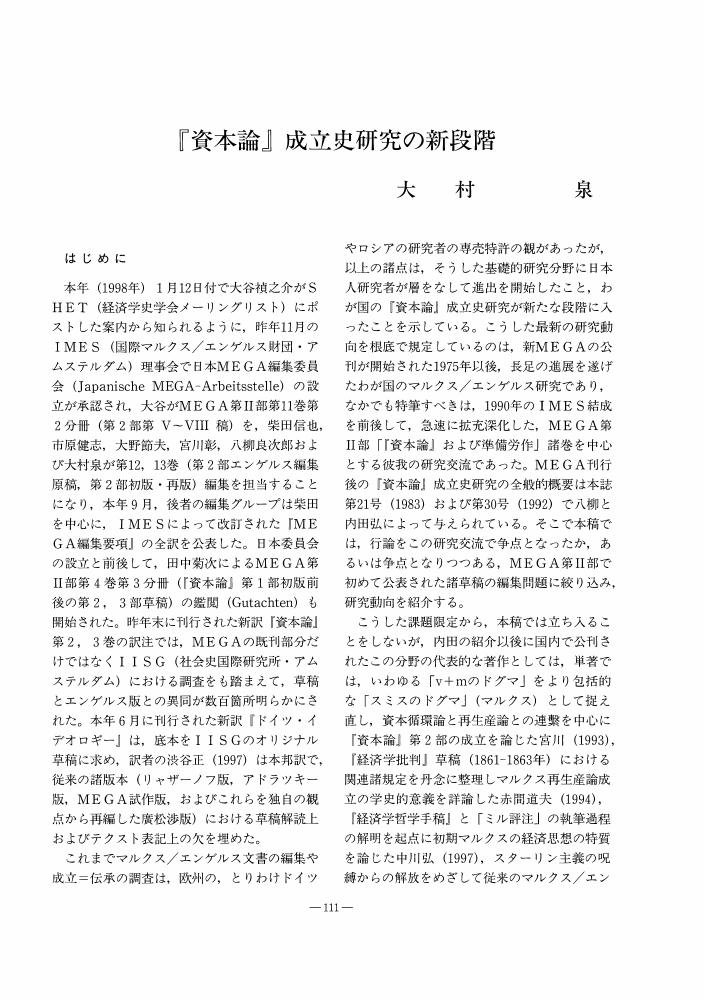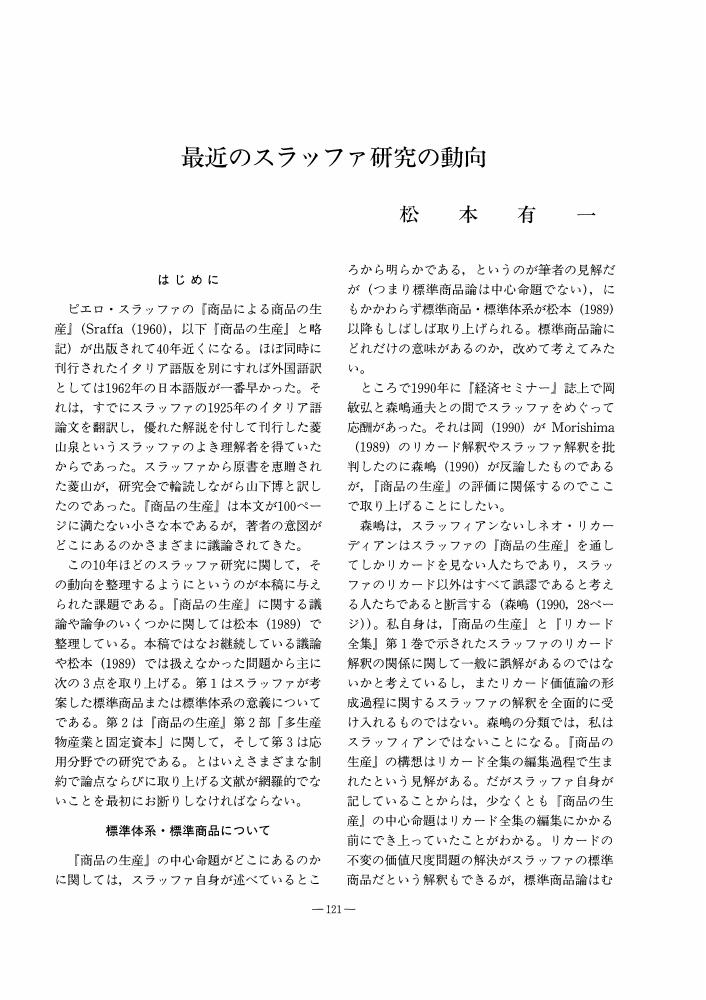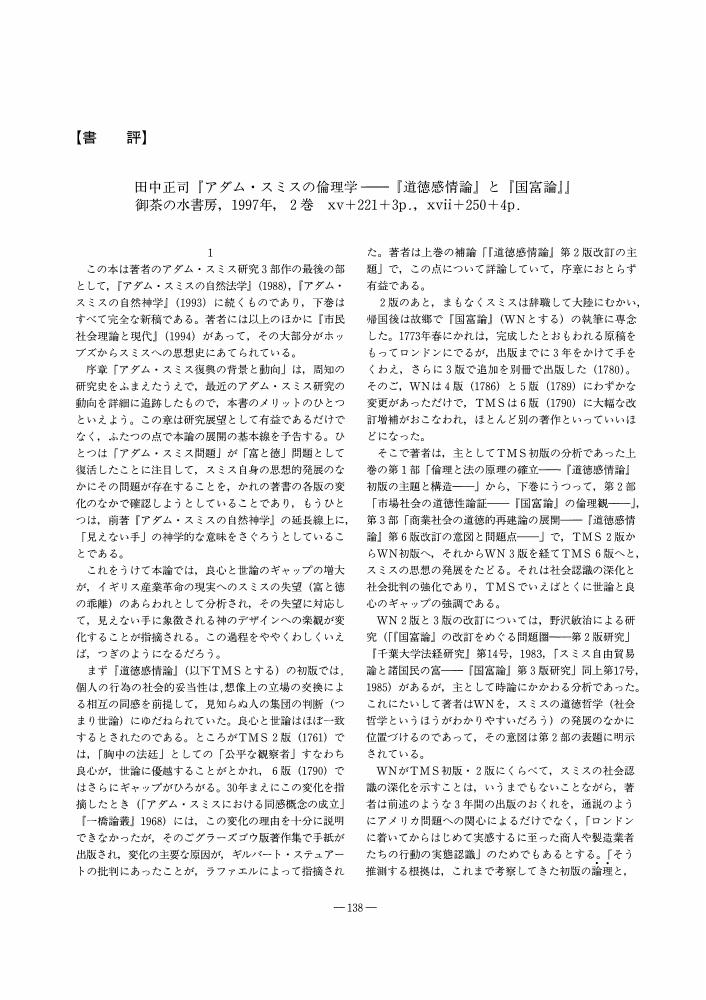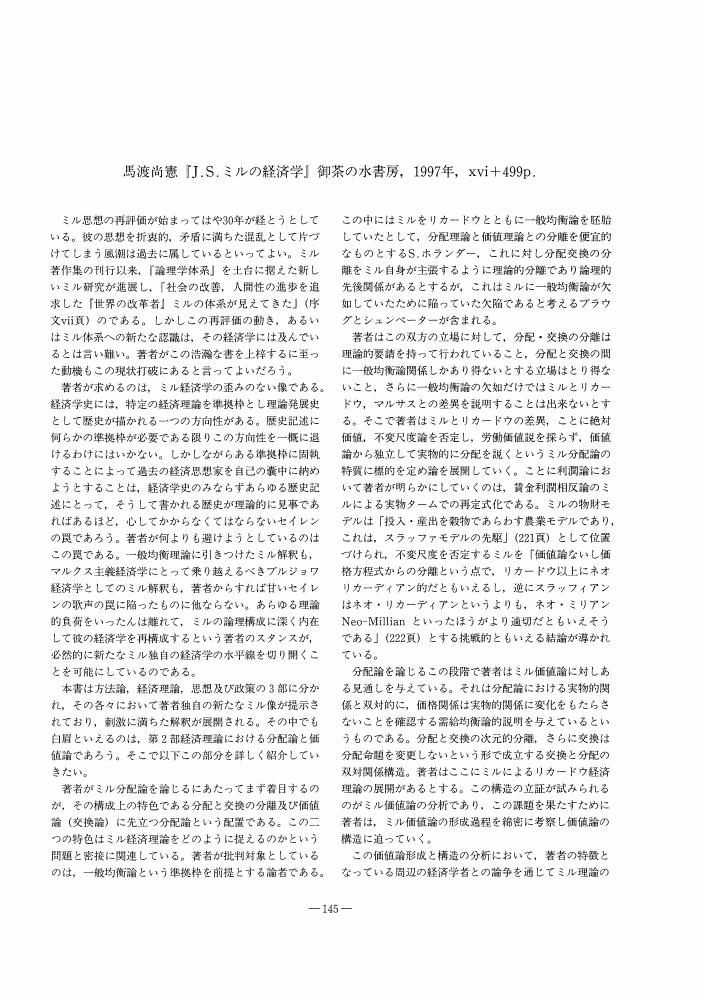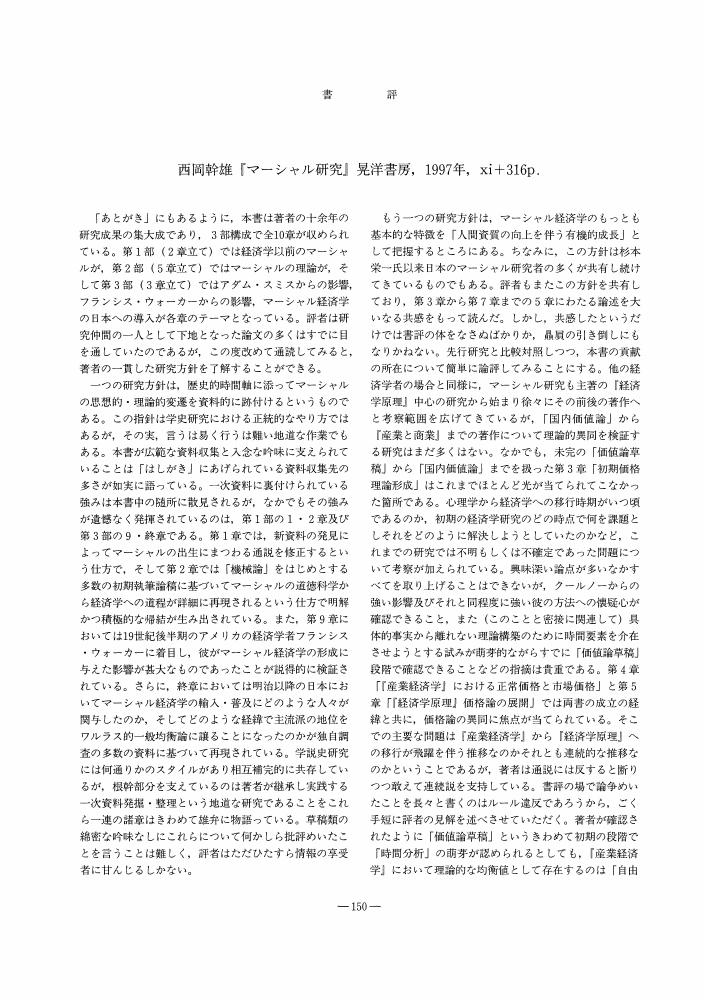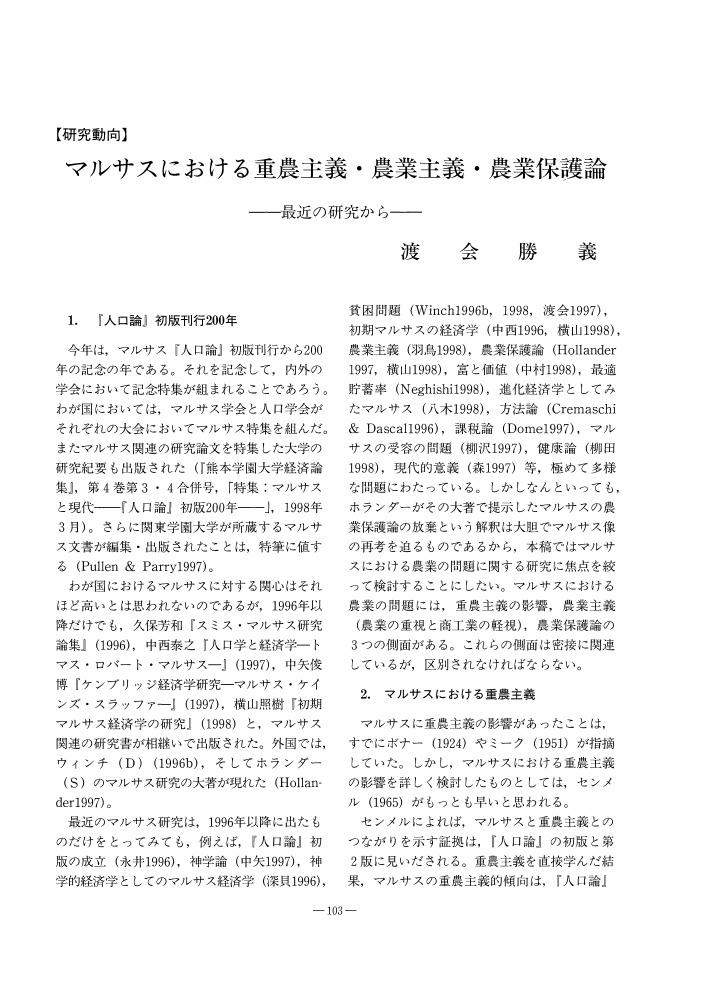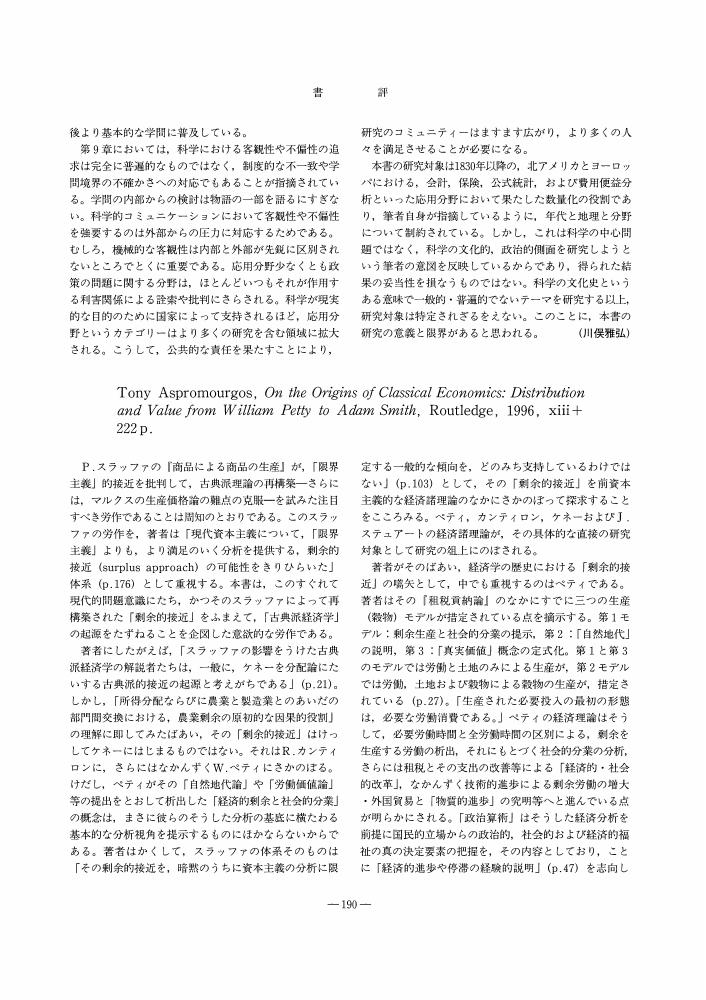1 0 0 0 OA 『資本論』成立史研究の新段階
- 著者
- 大村 泉
- 出版者
- The Japanese Society for the History of Economic Thought
- 雑誌
- 経済学史学会年報 (ISSN:04534786)
- 巻号頁・発行日
- vol.36, no.36, pp.111-120, 1998 (Released:2010-08-05)
- 参考文献数
- 62
1 0 0 0 OA 最近のスラッファ研究の動向
- 著者
- 松本 有一
- 出版者
- The Japanese Society for the History of Economic Thought
- 雑誌
- 経済学史学会年報 (ISSN:04534786)
- 巻号頁・発行日
- vol.36, no.36, pp.121-127, 1998 (Released:2010-08-05)
- 参考文献数
- 29
- 著者
- 平井 俊顕
- 出版者
- The Japanese Society for the History of Economic Thought
- 雑誌
- 経済学史学会年報 (ISSN:04534786)
- 巻号頁・発行日
- vol.36, no.36, pp.128-137, 1998 (Released:2010-08-05)
- 参考文献数
- 17
- 著者
- 水田 洋 田中 正司
- 出版者
- 経済学史学会
- 雑誌
- 経済学史学会年報 (ISSN:04534786)
- 巻号頁・発行日
- vol.36, no.36, pp.138-140, 1998 (Released:2010-08-05)
1 0 0 0 OA 中宮光隆『シスモンディ経済学研究』三嶺書房, 1997年, ix+245p.
- 著者
- 藤田 勝次郎
- 出版者
- 経済学史学会
- 雑誌
- 経済学史学会年報 (ISSN:04534786)
- 巻号頁・発行日
- vol.36, no.36, pp.141-142, 1998 (Released:2010-08-05)
- 著者
- 柳田 芳伸 中西 泰之
- 出版者
- 経済学史学会
- 雑誌
- 経済学史学会年報 (ISSN:04534786)
- 巻号頁・発行日
- vol.36, no.36, pp.142-144, 1998 (Released:2010-08-05)
1 0 0 0 OA 馬渡尚憲『J. S. ミルの経済学』御茶の水書房, 1997年, xvi+499p.
- 著者
- 松井 名津
- 出版者
- 経済学史学会
- 雑誌
- 経済学史学会年報 (ISSN:04534786)
- 巻号頁・発行日
- vol.36, no.36, pp.145-146, 1998 (Released:2010-08-05)
- 著者
- 山中 隆次
- 出版者
- 経済学史学会
- 雑誌
- 経済学史学会年報 (ISSN:04534786)
- 巻号頁・発行日
- vol.36, no.36, pp.147-148, 1998 (Released:2010-08-05)
1 0 0 0 OA 清水敦『貨幣と経済 -貨幣理論の形成と展開-』昭和堂, 1997年, x+243p.
- 著者
- 水田 健
- 出版者
- 経済学史学会
- 雑誌
- 経済学史学会年報 (ISSN:04534786)
- 巻号頁・発行日
- vol.36, no.36, pp.148-149, 1998 (Released:2010-08-05)
1 0 0 0 OA 西岡幹雄『マーシャル研究』晃洋書房, 1997年, xi+316p.
- 著者
- 藤井 賢治 西岡 幹雄
- 出版者
- 経済学史学会
- 雑誌
- 経済学史学会年報 (ISSN:04534786)
- 巻号頁・発行日
- vol.36, no.36, pp.150-152, 1998 (Released:2010-08-05)
1 0 0 0 OA ジェントルマン資本主義論とアダム・スミス
- 著者
- 渡辺 惠一
- 出版者
- The Japanese Society for the History of Economic Thought
- 雑誌
- 経済学史学会年報 (ISSN:04534786)
- 巻号頁・発行日
- vol.36, no.36, pp.1-13, 1998 (Released:2010-08-05)
- 参考文献数
- 64
The history of economic thought should be studied in light of the latest historical studies, since its main purpose as a field of inquiry, generally speaking, is to interpret economic writings in historical context. ‘Gentlemanly Capitalism’ as defined by P. J. Cain and A. G. Hopkins is the most important paradigm in the historical study of modern Britain in the last thirty years. It describes a British society in which between 1688 and 1850 the landed, in alliance with the moneyed and commercial interests, have dominated the economy and polity. This perspective is rooted in recent interpretations of the industrial revolution which stress that the manufacturing interests did not make a steady or complete rise either to economic or political supremacy.This paper challenges the traditional view of Adam Smith, the author of the Theory of Moral Sentiments (1759) and the Wealth of Nations (1776), who predicted that industrial capitalists would become hegemonic in British society in the nineteenth century. This challenge is carried out by rereading the historical dimension of the Wealth of Nations in favour of the ‘Gentlemanly Capitalism’ thesis. Our conclusion is that Smith considered the ‘civilized society’ to be one engaged in agrarian capitalism in which a progressive landed gentry holds economic and political hegemony. In a word, the Wealth of Nations expounded the Political Economy of the landed gentry. Our interpretation of Smith basically supports Cain and Hopkins's view with the exception that it does not include the commercial interests as they do in the list of gentlemanly capitalists.
1 0 0 0 OA 「ジェントルマン資本主義」論とJ. A. ホブスン研究
- 著者
- 姫野 順一
- 出版者
- The Japanese Society for the History of Economic Thought
- 雑誌
- 経済学史学会年報 (ISSN:04534786)
- 巻号頁・発行日
- vol.36, no.36, pp.14-25, 1998 (Released:2010-08-05)
- 参考文献数
- 108
As a contribution to the research for the history of economic theory and social thought, this paper clarifies the significance of the “Gentlemanly Capitalism” thesis proposed by P. F. Cain and A. G. Hopkins in the mid-1980's in the field of English history, particularly Social and Economic history.First, we examine the emergence of this thesis chronologically focusing on its methodology and analyse the unique view of investment that characterises this thesis. Second, following the disputes surrounding its iconoclastic proposition, we summarise its shortcoming in the lack of the consumption perspective in dealing with the class policy. Third, concerning Cain's reseach on the imperialism theory of J. A. Hobson, the significance of the P. F. Clarke's criticism is discussed. In conclusion, “Gentlemanly Capitalism” thesis is judged as a static theory of the investment struture. A dynamic analysis of the social process of policy making is missing.
1 0 0 0 OA モラル・エコノミーとポリティカル・エコノミー
- 著者
- 音無 通宏
- 出版者
- The Japanese Society for the History of Economic Thought
- 雑誌
- 経済学史学会年報 (ISSN:04534786)
- 巻号頁・発行日
- vol.36, no.36, pp.26-39, 1998 (Released:2010-08-05)
Economics today is confronted with great difficulties as it attempts to theoretically treat environmental concerns and many other serious problems. This situation, in my view, has been brought about partly by the way of thinking that confines economics largely to the analysis of the price mechanisms of goods in so far as they find their way into the market. On the contrary, the conception of “moral economy” as formulated by E. P. Thompson recognises that many important facets of the life of people in a society exist outside the market. Through research into historical sources of the food riots in eighteenth century England, he found that there existed a traditional and customary right to subsistence among the labouring poor. These poor repeatedly rioted against increases in corn and bread prices in times of dearth, selling them at prices they set themselves. In light of this history, Thompson severely criticised Adam Smith's theory of free trade in the corn market as victimizing the labouring poor, and hence he criticised Smith's political economy as a whole. However, despite his correctness in emphasising the necessity for remedies to scarcity among the poor, he seems to have misunderstood the character and nature of political economy in general. Political economy from Smith to J. S. Mill and economics even after the 1870s sought to remedy the poverty of the labouring poor as a subject and to reconcile their rights to subsistence with the right of property.
1 0 0 0 OA 近代世界システム論と歴史認識の転換
- 著者
- 松岡 利道
- 出版者
- The Japanese Society for the History of Economic Thought
- 雑誌
- 経済学史学会年報 (ISSN:04534786)
- 巻号頁・発行日
- vol.36, no.36, pp.40-51, 1998 (Released:2010-08-05)
- 参考文献数
- 25
I. Wallerstein advanced a theoretical and historical account of the origins and structure of the modern world-system. There are two important points in his theory. First, he criticized the traditional theory of the state. In the modern world-system theory, he holds, the subject of analysis is not the nation-state but inter-state relations. Second, he denied the possibility of national development in the modern world-system. In his view, the constituent institutions in the system such as nation-states cannot develop independently, but rather merely change their economic and political position within the system.World-systems analysis emerged as a critique of current social science, and while there exist some theoretical contradictions to resolve in this type of analysis, it is concluded that it has raised important questions for current social science to grapple with. In Race, Nation, Class by Wallerstein and Balibar, we find a promising direction in which to develop the modern world-system theory.
1 0 0 0 OA リカードウ新機械論の論理
- 著者
- 星野 富一
- 出版者
- The Japanese Society for the History of Economic Thought
- 雑誌
- 経済学史学会年報 (ISSN:04534786)
- 巻号頁・発行日
- vol.36, no.36, pp.52-63, 1998 (Released:2010-08-05)
This paper focuses on how the theoretical framework of Ricardo's new position on machinery has changed on account of a revolutionary change in his conclusions in the third edition of Principles:. In this edition he proposed, namely, that some portion of the laboring class might lose employment because of the introduction of new machinery.Professor Takuya Hatori claims that Ricardo has maintained the proposition that the demand for labor depends on the size of a nation's gross product while admittingly only that there will be a diminution in the demand for labor due to the introduction of new machinery.My view is that Ricardo has attained the following important results: First, Ricardo has refuted ‘the compensation theory’ by assuming a socially representative unit of capital, by precisely setting the theoretical framework for fixed aggregate capital, and by introducing a theory in which circulating capital is replaced with fixed capital; second, he has not only asserted that an introduction of machinery probably diminishes the quantity of gross product and, hence, the demand for labor, but has also tried to prove it.
- 著者
- 近藤 高弘
- 出版者
- The Japanese Society for the History of Economic Thought
- 雑誌
- 経済学史学会年報 (ISSN:04534786)
- 巻号頁・発行日
- vol.36, no.36, pp.90-102, 1998 (Released:2010-08-05)
- 参考文献数
- 26
Edward Gibbon Wakefield, known as a British Colonial Imperialist, was a free constitutionalist in the first half of the nineteenth century. In 1844, in order to promote imperial unity and to encourage prosperity both at home and in the colonies, he argued for constitutional reform in the British North American colonies. In the face of the Canadian political crisis, Wakefield argued for greater freedom for the Provincial government to promote own legislation, thereby increasing the autonomy of the colony. He thought that the surrendering patronage to the Canadian Province would be effective as a remedy to the crisis, so that the provincial cabinet was responsible solely to the colonial legislature. Wakefield intended in part to revise the recommendation in the Durham Report, and to make the British colonies an extension of Great Britain so they would attract enfranchised emigrants from the Isles. The paper concludes that despite Wakefield's argument, the Revolutionary Settlement as a reforming model could not be transplanted to the colonies either in theory and practice.
1 0 0 0 OA マルサスにおける重農主義・農業主義・農業保護論
- 著者
- 渡会 勝義
- 出版者
- The Japanese Society for the History of Economic Thought
- 雑誌
- 経済学史学会年報 (ISSN:04534786)
- 巻号頁・発行日
- vol.36, no.36, pp.103-110, 1998 (Released:2010-08-05)
- 参考文献数
- 41
- 著者
- 川島 信義
- 出版者
- The Japanese Society for the History of Economic Thought
- 雑誌
- 経済学史学会年報 (ISSN:04534786)
- 巻号頁・発行日
- vol.35, no.35, pp.190-191, 1997 (Released:2010-08-05)
- 著者
- 上宮 正一郎
- 出版者
- The Japanese Society for the History of Economic Thought
- 雑誌
- 経済学史学会年報 (ISSN:04534786)
- 巻号頁・発行日
- vol.35, no.35, pp.191-193, 1997 (Released:2010-08-05)
1 0 0 0 OA J. J. Krabbe, Historicism and Organicism in Economics, Kluwer Academic Publishers, 1996, x+188 p.
- 著者
- 池田 幸弘
- 出版者
- The Japanese Society for the History of Economic Thought
- 雑誌
- 経済学史学会年報 (ISSN:04534786)
- 巻号頁・発行日
- vol.35, no.35, pp.193-194, 1997 (Released:2010-08-05)
